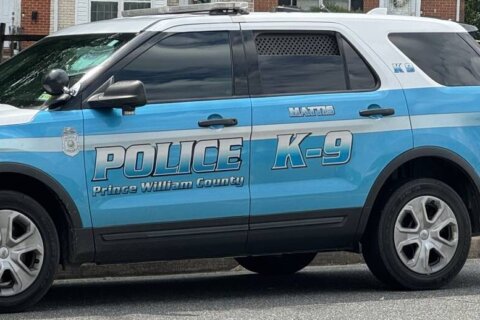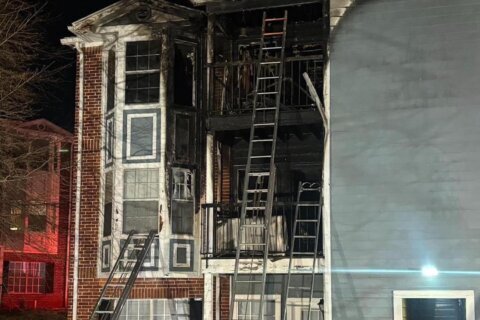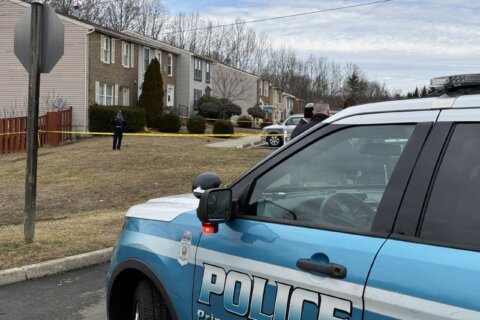This article was republished with permission from WTOP’s news partner InsideNoVa.com. Sign up for InsideNoVa.com’s free email subscription today.
This article was written by WTOP’s news partner InsideNoVa.com and republished with permission. Sign up for InsideNoVa.com’s free email subscription today.
Prince William County officials are pumping the brakes on potential vehicle tax impacts fueled by racing values while reducing increases to real estate taxes.
However, the measures do not fully eliminate expected increases in tax bills.
At Tuesday’s Board of Supervisors meeting, county officials proposed a further reduction in the real estate tax rate from $1.115 per $100 of assessed value to $1.03 in the budget for fiscal 2023, which starts July 1. The original proposal dropped the rate to $1.05.
“We wanted to go further, we just didn’t have the capacity to do it without making severe cuts in programs and services,” said Interim County Executive Elijah Johnson.
While the rate is dropping, rising property values will result in an effective tax increase. Under the initial proposal, the average residential tax bill would increase $266, or 5.7%, on a home valued at $469,842, the median home value in the county. With the further reduction of the real estate tax rate, bills would still rise $172 on a home of the same value.
The rate would need to be lowered to $1 per $100 of assessed value to avoid an effective tax increase. Supervisors reduced the real estate tax rate in the current fiscal year from $1.125 per $100 of assessed value to $1.115, but homeowners still saw an average increase of about $264.
Meanwhile, officials also proposed assessing vehicles at 80% of their estimated value for personal property tax bills to combat unusual increases in used car values.
A computer chip shortage caused by the COVID-19 pandemic has made new vehicles harder to come by, driving up assessments on used ones. According to the U.S. Bureau of Labor Statistics, the average price of used cars and trucks rose 40.5% from January 2021 to January of this year.
The unexpected changes in values could lead to highly unusual increases in most personal property tax bills for Prince William County residents. Typically, personal property tax bills decrease over time because as a car gets older, its assessed value drops.
Prince William County officials have projected assessment increases for virtually all of the roughly 161,000 vehicles registered locally and made since 2007.
The county is not proposing a decrease to its personal property tax rate, which is $3.70 per $100 of assessed value. Similar to the situation for homeowners when assessments rise, keeping the same tax level results in an effective tax increase.
In an emailed statement, county officials said the change “does not fully negate increases to personal property tax bills; however, it will help negate the impact to taxpayers as the result of increasing used car values.”
County officials have not provided an estimate on how much vehicle owners could see their bills rise with the lesser assessments.
At full assessment, the majority of the local vehicles – 88,998 of them – would see their value grow between $501 and $2,500, leading to an increase in bills of $19 to $93.
The second most-common projection is an increase between $2,501 and $5,000 for 45,722 vehicles. Those vehicles would see their bills rise between $93 and $185.
Only 11,864 vehicles had an increase in value less than $500, leading to up to $19 tacked onto their tax bill.
The county expects the changes will reduce the projections for total revenues by about $8.8 million.
Spending changes
The changes to tax rates were part of the routine budget recap when officials present revisions to the initial budget proposal.
The majority of the board’s discussion came around employees.
The initial budget proposed a 1% across-the-board, cost-of-living pay increase for employees, plus eligibility for a 3% performance-based pay raise.
The revised proposal would not include the cost-of-living adjustment. Instead, employees would be eligible for up to 6% in a performance-based pay raise.
Supervisor Jeanine Lawson, R-Brentsville, pushed for the county to not add any employee positions because, she said, the county currently has 453 vacancies.
“That’s a lot of vacancies,” she said. “It’s irresponsible to continue to ask the taxpayers to fund positions when we can’t fill the seats they’re already funding.”
Lawson supported the 6% pay increases, but she said the county should also have a cost-of-living adjustment to “put more effort into our existing employees.”
Johnson said some vacant and funded positions were shifted in the budget, particularly in economic development.
“We make sure that these are positions that they need,” he said. “We don’t take it lightly when we are recommending positions to you.”
Chair Ann Wheeler did not support removing requested new positions without a specific proposal. Other supervisors wanted to gather additional information about the vacancies ahead of next week’s board meeting.
“Obviously the eight of us are bothered by that many vacant positions,” Lawson said. “It’s a problem. It’s a bit alarming.”
Public hearing
Forty-eight people spoke at a public hearing on the budget during Tuesday’s meeting. Among the items hit on were:
Five people advocated for more funding toward CASA, an organization that advocates for immigrants.
Fourteen people advocated for the county to fund a public-private partnership to construct an indoor multi-use facility.
Three speakers called for the creation of a county office of early childhood.
One requested more funding for Spanish-language services.
Two speakers called for more funding toward affordable housing and another said employees should get a higher pay increase.
One person supported the planned 24-hour crisis receiving center, which is supported with $2.7 million in the budget. The state defines crisis stabilization services as direct interventions to avert emergency psychiatric hospitalization or institutional placement for people suffering mental health crises. The unit would accept drop-offs and people under temporary detention orders to connect them with treatment and services. The facility would include 16 beds and cost $4.7 million. The county is expecting $2 million in annual state funding and to use federal relief money for one-time costs.
Two people called for higher pay increases for public safety personnel.
Twenty people opposed the proposed tax rates.
Potomac District resident Eric Von Tersch said his tax bills would have increased 14.5% over two years. “I’ve really got to wonder why the local government can’t do the same thing we’re asked to do, which is live within our means,” he said.
Coles resident Ben Baldwin opposed the proposed meals tax, saying it could hurt businesses. “When [people] decide not to go out to eat, those restaurants lose revenue,” he said.
Brentsville resident Josh Quill said the real estate tax rate needs to be reduced to create an equalized tax bill and the meals tax is not appropriate at this time.
“I understand we all have difficult decisions to make,” he said. “But whether to take your family out for a celebratory lunch after a hard-played kids soccer game on a Saturday afternoon shouldn’t be one of them.”
Potomac District resident Daniel Wheeler said his home increased in value by $54,000, and his tax bills would go up significantly.
“The county might not be responsible for inflation or rising interest rates, but you are responsible for how you respond,” he said. “And you’ve responded terribly.”
The budget is scheduled for adoption by April 26.







